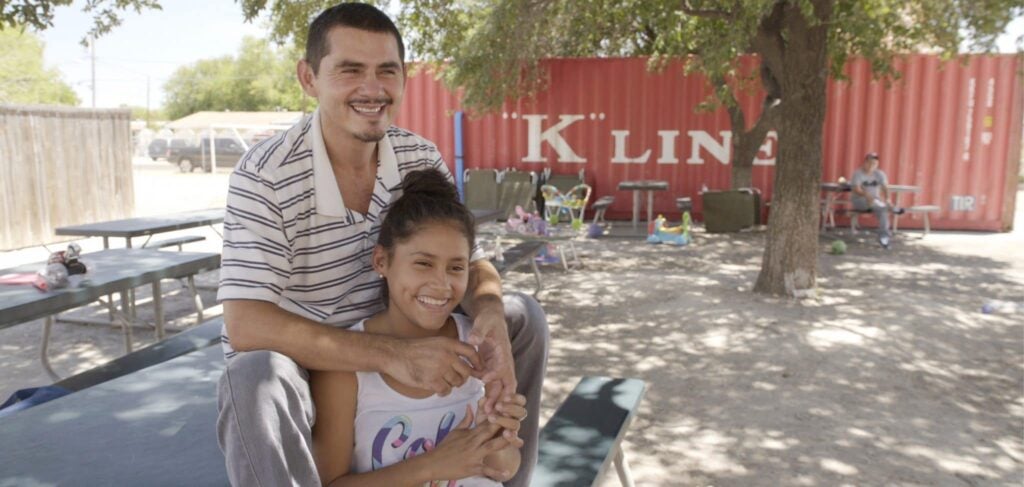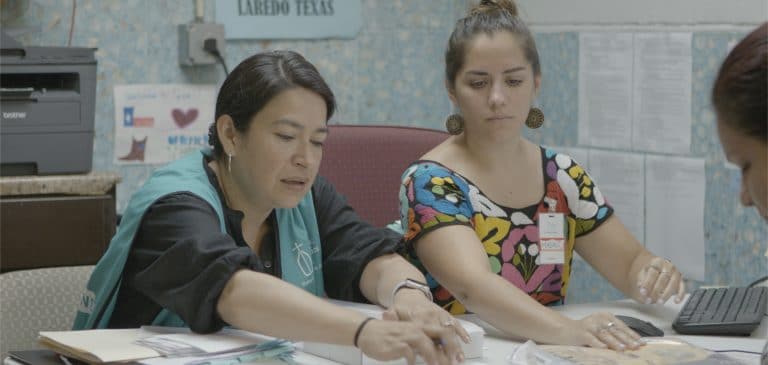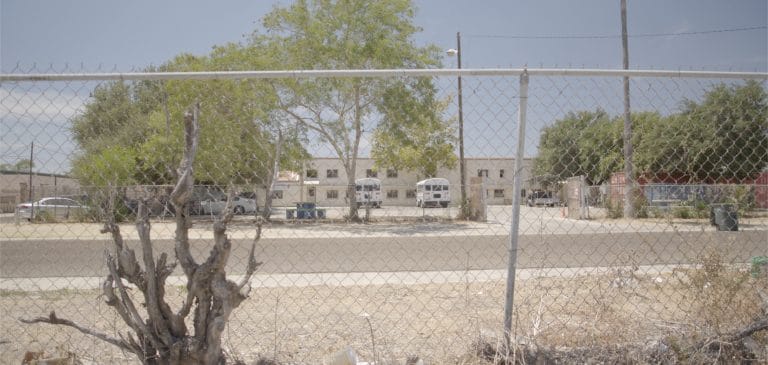

By Kat Kelley, MSW, Director of Strategic Initiatives, Catholic Charities of Oregon
The humanitarian crisis on the southern U.S. border has garnered national and international attention over the last few years. Images of unaccompanied minors in massive congregate shelters and young families traumatized and weary after crossing multiple international borders – often on foot – have rightly horrified any supporter of human rights the world over.
While increasing attention has been paid to what is occurring on the southern border, very little attention has focused on the lived reality of asylum seekers as they travel to their future homes in the interior of the United States.
To better coordinate and improve the extremely limited services currently provided to asylum seekers in the interior, Catholic Charities USA, the United States Conference of Catholic Bishops (USCCB), the Catholic Legal Immigration Network (CLINIC) and Catholic Charities of Oregon have partnered to create and implement a service network unique to the needs and experiences of asylum-seeking families and individuals. The project – named The Border is Everywhere (TBIE) – supports access to wraparound services that promote the healthy integration and wellbeing of our newest neighbors as they start their lives in the United States.
For decades, the Catholic migration services community has been a leader in welcoming the stranger and providing essential supports to newly arriving families. Many asylum seekers leaving detention on the border pass through a Catholic Charities humanitarian respite center. At the respite center, they receive food, clothing, showers, basic healthcare and other fundamental services.

While immediate humanitarian support in respite centers post-release is absolutely essential to the wellbeing of asylum seekers in their first days in their new country, it is imperative that asylum advocates and allies recognize the enormous challenges faced by asylum seekers as they enter their next step in the asylum process in communities around the country.
Contrary to common misperceptions, asylum seekers are not eligible for federally-funded benefits or resources, including SNAP, Medicaid or HUD. In addition to being ineligible for federal benefits, they also face enormous barriers to employment—asylum seekers must wait 365 days after filing an asylum application before they can apply for employment authorization.
Moreover, while the majority of asylum-granting nations place certain limitations on rights to work for asylum seekers, the United States is the only country that denies both employment authorization and benefits. Without access to employment or benefits – including legitimate options for housing, food or healthcare – asylum seekers are forced to the margins of our society to live in a state of abject poverty and are often criminalized for simply trying to survive.
These restrictions are not unique today and have impeded the life, liberty and pursuit of happiness of asylum seekers for many decades. For asylum seekers, crossing the border is just the beginning of the barriers they will face in attempting to establish safety and security in the United States. These barriers only increase as they go deeper into the country. For asylum seekers, the border is everywhere.
In response, TBIE supports the Catholic Charities humanitarian respite centers by offering direct referrals to Catholic Charities migration services programs at the destination locale. At the locale, asylum seekers are connected with social workers with specialized skills in the following areas: trauma due to forced migration, systems navigation across heavy barriers and culturally-responsive services.
The social workers partner closely with immigration legal services and other providers to support asylum seekers in addressing and breaking down barriers that impact their ability to comply with immigration court requirements. They also guide asylum seekers throughout the confusing and complex process of establishing asylum.
While increasing attention has been paid to what is occurring on the southern border, very little attention has focused on the lived reality of asylum seekers as they travel to their future homes in the interior of the United States.
To better coordinate and improve the extremely limited services currently provided to asylum seekers in the interior, Catholic Charities USA, the United States Conference of Catholic Bishops (USCCB), the Catholic Legal Immigration Network (CLINIC) and Catholic Charities of Oregon have partnered to create and implement a service network unique to the needs and experiences of asylum-seeking families and individuals. The project – named The Border is Everywhere (TBIE) – supports access to wraparound services that promote the healthy integration and wellbeing of our newest neighbors as they start their lives in the United States.
For decades, the Catholic migration services community has been a leader in welcoming the stranger and providing essential supports to newly arriving families. Many asylum seekers leaving detention on the border pass through a Catholic Charities humanitarian respite center. At the respite center, they receive food, clothing, showers, basic healthcare and other fundamental services.
While immediate humanitarian support in respite centers post-release is absolutely essential to the wellbeing of asylum seekers in their first days in their new country, it is imperative that asylum advocates and allies recognize the enormous challenges faced by asylum seekers as they enter their next step in the asylum process in communities around the country.
Contrary to common misperceptions, asylum seekers are not eligible for federally-funded benefits or resources, including SNAP, Medicaid or HUD. In addition to being ineligible for federal benefits, they also face enormous barriers to employment—asylum seekers must wait 365 days after filing an asylum application before they can apply for employment authorization.

Moreover, while the majority of asylum-granting nations place certain limitations on rights to work for asylum seekers, the United States is the only country that denies both employment authorization and benefits. Without access to employment or benefits – including legitimate options for housing, food or healthcare – asylum seekers are forced to the margins of our society to live in a state of abject poverty and are often criminalized for simply trying to survive.
These restrictions are not unique today and have impeded the life, liberty and pursuit of happiness of asylum seekers for many decades. For asylum seekers, crossing the border is just the beginning of the barriers they will face in attempting to establish safety and security in the United States. These barriers only increase as they go deeper into the country. For asylum seekers, the border is everywhere.
In response, TBIE supports the Catholic Charities humanitarian respite centers by offering direct referrals to Catholic Charities migration services programs at the destination locale. At the locale, asylum seekers are connected with social workers with specialized skills in the following areas: trauma due to forced migration, systems navigation across heavy barriers and culturally-responsive services.
The social workers partner closely with immigration legal services and other providers to support asylum seekers in addressing and breaking down barriers that impact their ability to comply with immigration court requirements. They also guide asylum seekers throughout the confusing and complex process of establishing asylum.








